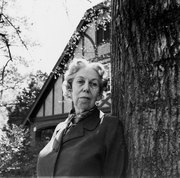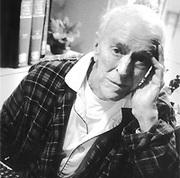 |
 |
Speaking of Eudora Welty, not long ago I came upon a fascinating set of conversations that Virginia Ross and Sally Wolff had with Welty and her friend and former editor William Maxwell about each other in 1999. Maxwell died the following year.
The two writers discussed, among other things, their opposing perspectives on using people and events from their own experiences in their fiction. Welty clearly disapproved of Maxwell’s reliance on autobiography. “I’m not used to people writing real things about their lives,” she said.
I can’t accept it. I try to protect people from it. Bill has written a lot of fiction that is autobiography. They’re very different forms. That’s the thing what would chain me back the most — if I had real life staring me in the face. I can only write fiction if I feel I’m not being tied down to reality. Bill is absolutely the opposite. It’s the method he uses to work from.
I understand the feeling he has when he reads The Folded Leaf now — trying to decide who is invented and who is remembered. Bill sticks closer to the facts than I do. He is scrupulous about facts. I never write about my life automatically, except when it was obvious that’s what I was doing, as in One Writer’s Beginnings. Otherwise, it would never occur to me to do so. His life was pretty sad, whereas mine was carefree — so we weren’t the same.
Maxwell, on the other hand, couldn’t imagine writing fiction that didn’t start with his own life.
I think Eudora may have had a moral disapproval of [my use of autobiography in fiction]. If I had had to write only about imaginary people, I would have had to close up my typewriter. I wrote about my life in less and less disguise as I grew older, and finally with no disguise — except the disguise we create for ourselves, which is self-deception.
But he did differentiate his own work from true autobiography, saying that, in his books:
I was a character in the sense that other people in the novel or story were characters, so there was a distance there. That made all the difference….
In my early drafts of The Folded Leaf I was of course recalling my own adolescence, and most adolescents are sullen and uncharitable — I certainly was. I described my father and stepmother pretty much as they actually were…. In revising the novel I thought about the fact that my father and stepmother had no sense of literature as something distinct from life and that it wasn’t decent to subject them to what would certainly have seemed to them an exposure. I made the father in that book a widower and a sporting character so that my father wouldn’t think I was writing about them. After the book was published a Lincoln friend of the family said “Why did you make your father like that?” There is no escaping the autobiographical assumption. My father never said anything, but later, when he read Time Will Darken It, he said he was glad the character that was based on him was a nice man. They had no sense of literature, and it isn’t fair to subject them to that.
Of course the question whether it’s ethical to mine real life in novels is a different question from whether doing so makes for good fiction. In Maxwell’s case, it did.